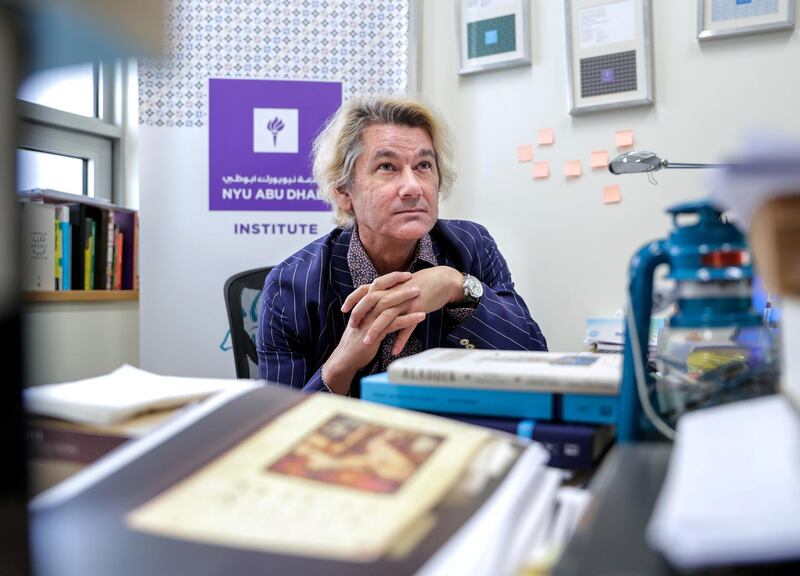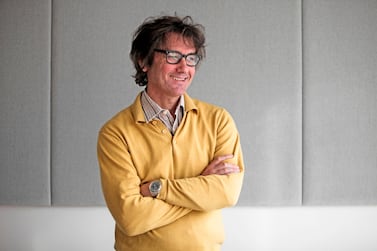"Writing academic books is a very private affair," says Philip Kennedy, professor of Middle Eastern and Islamic studies and comparative literature at New York University Abu Dhabi. "I feel lucky when a book is published, lucky if someone in my field notices it and writes a review, lucky if a student takes it up for a class."
So you can probably imagine how Kennedy felt when he discovered earlier this year – via text message – that he had won a Sheikh Zayed Book Award for his 2016 work, Recognition in the Arabic Narrative: Tradition: Discovery, Deliverance and Delusion. "I thought I was dreaming and then realised I wasn't," he says. "I was happy but mostly proud, actually. I've heard people say before that they are proud to be associated with Sheikh Zayed through the award and I share that."
Kennedy's book, which was nominated in the Arabic Culture in Other Languages category, is an exploration of the "recognition scene" in the Arabic narrative tradition. The recognition scene is that moment when a character moves from ignorance to knowledge. One of the best examples of this occurs in Sophocles's Greek tragedy, Oedipus Rex, in which a son discovers that his wife is his mother. But so many narratives, from Shakespeare's King Lear to M Night Shyamalan's 1999 film The Sixth Sense, hinge on this device.
Kennedy, who has been teaching at NYU Abu Dhabi since 2008, analysed five Arabic texts, including the Quran and the biography of the Prophet Mohammed, to evaluate the role of the recognition scene in Arabic literature. "People are puzzled and their eyes glaze over when I talk about it," he jokes. "Although when I watch a film with my wife, now she says, 'There's a recognition scene.'"
You get the impression that this alone has made it all worthwhile.
Kennedy is downplaying his achievement. This award is a huge pat on the back from the academic community – not to mention the fact that it is worth $200,000 (Dh735,000) to the winner. Previous winners in this category include Mario Liverani and Marina Warner, who has also won a Truman Capote Award for Literary Criticism.
There is certainly no false modesty, then, when Kennedy, a previous judge of the award, says how surprised he was to be nominated, let alone win. "You think, 'There's no way I'm going to win, I know the guys who wrote the other shortlisted books,'" says Kennedy. "I thought one of them would pip me at the post. You realise it's a zero sum game: on the one hand you're excited, on the other hand it's a crapshoot, like buying a lottery ticket." He pauses at this point, before adding: "Then you win and it's completely different. You can't stop smiling. The funny thing is, I heard on Valentine's Day, so there was a romantic element, too."
There is an amusing juxtaposition between the excitable things Kennedy is saying and the way he is saying them. He speaks in softly delivered, ponderous sentences.
It is as if he is turning each word over in his mind, to make sure it is just the right one, before allowing it to leave his mouth. But he is excellent company, sharing stories about his first visit to Al Ain in 1982 and his old lecturers at Oxford University. He meanders this way and that, plucking out literary allusions from East and West to illustrate his points. “I read quite broadly, I must say,” he tells me, half-smiling at the understatement.
This award is richly deserved for a man not only devoted to his subject, but determined to share his passions as widely as possible. In 2013, for example, aided by a grant from NYU Abu Dhabi, Kennedy helped to create the Library of Arabic Literature, a series of modern English-language translations of Arabic texts, including The Life of Ibn Hanbal and The Principles of Sufism.
He has encountered problems with distribution across the Arab world, but his determination to spread the joys of Arabic literature remains undimmed. "The important thing is to get on with the work, produce second and third editions that might find themselves in bookstores here," he says.
Kennedy has been immersed in Middle Eastern culture from a young age. As a child growing up in Pakistan and later in Tunisia, he wanted to be an archaeologist and dreamt of living in Cairo, speaking Arabic and digging about underground. In a sense, this eventually happened – Kennedy spent a year in Egypt as part of his undergraduate degree in Oriental Studies at Pembroke College, Oxford – but by this stage, he had given up on the idea of archaeology, instead deciding to pursue a career in academia. “In England, I was told, ‘If you become an archaeologist, you’ll end up in Northumberland digging up Roman villas,’” he says. “After four years [at university], my Arabic was still pretty shoddy, so you think, ‘Presumably I’ll know it by the end of a PhD,’ and so you carry on and by then it’s too late to do anything else.”
At school, Kennedy had excelled at languages, studying French, Spanish, Latin and Greek. “I was fascinated by the idea of looking at a page and being completely outside of it,” he says. “It didn’t mean anything to me, but there is the knowledge that you could read it one day.”
After completing his undergraduate degree, Kennedy returned to Oxford in 1991 for his PhD and then held a junior research fellowship at St Johns College, Oxford, until 1996. Shortly afterwards, he moved to New York with his wife and young family to teach at NYU, where he remained for 12 years, before being asked to help build the academic curriculum at NYU Abu Dhabi.
“People who are interested in higher education look at this experiment [in Abu Dhabi] to see whether it would work and on the whole those who are exposed to this place are impressed by it,” he says. “It’s grown and strengthened since the first class arrived.”
Kennedy now considers Abu Dhabi home. “I’ve felt welcome here,” he says. “I think it’s a tolerant place. Eighty per cent of people here are not Emirati, what kind of nation does that?” And you sense that his love of Arabic literature will keep him here for many more years yet.
“There was a point in my life where I actually felt I could read something very different [in Arabic] and appreciate it,” he says. “That gives you a fillip of excitement, knowing it’s a speciality you have.”
The Sheikh Zayed Book Award presentation ceremony takes place today at the Plaza Auditorium, Louvre Abu Dhabi. The winners will later speak at the Abu Dhabi International Book Fair at 8pm








